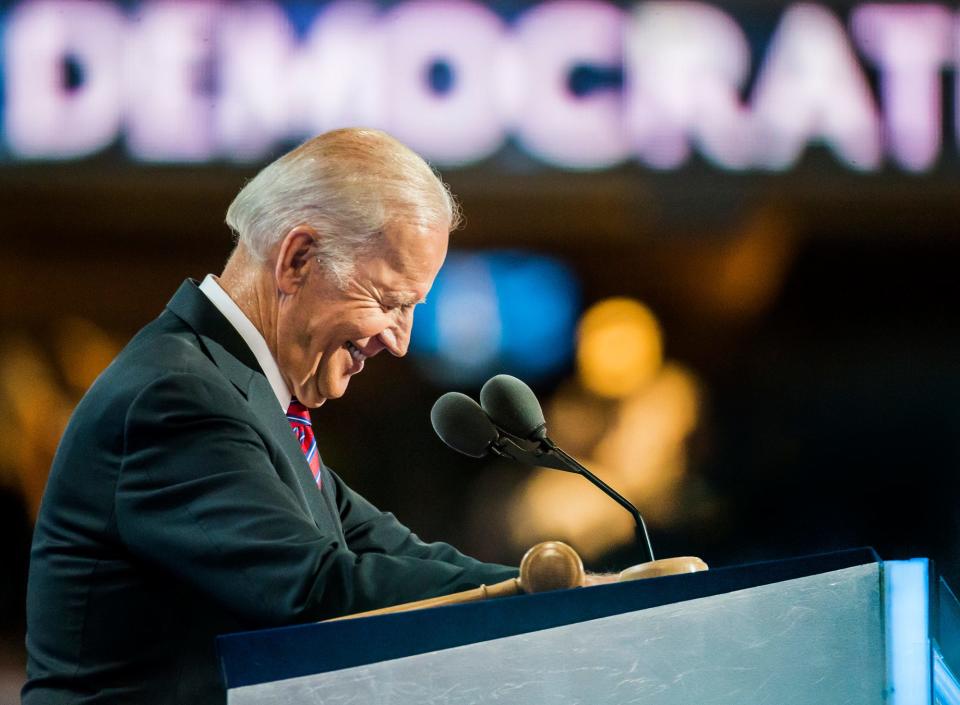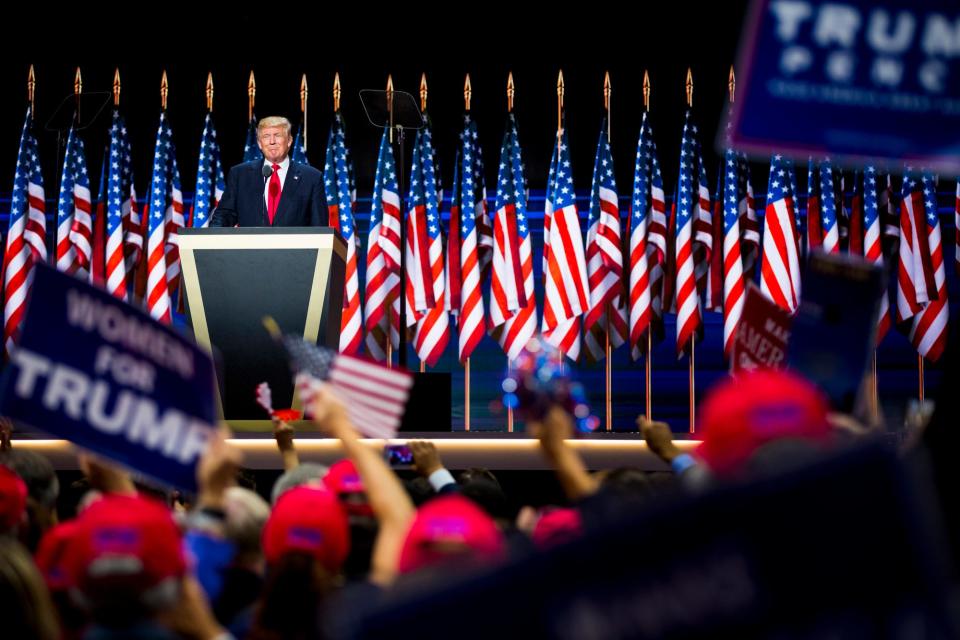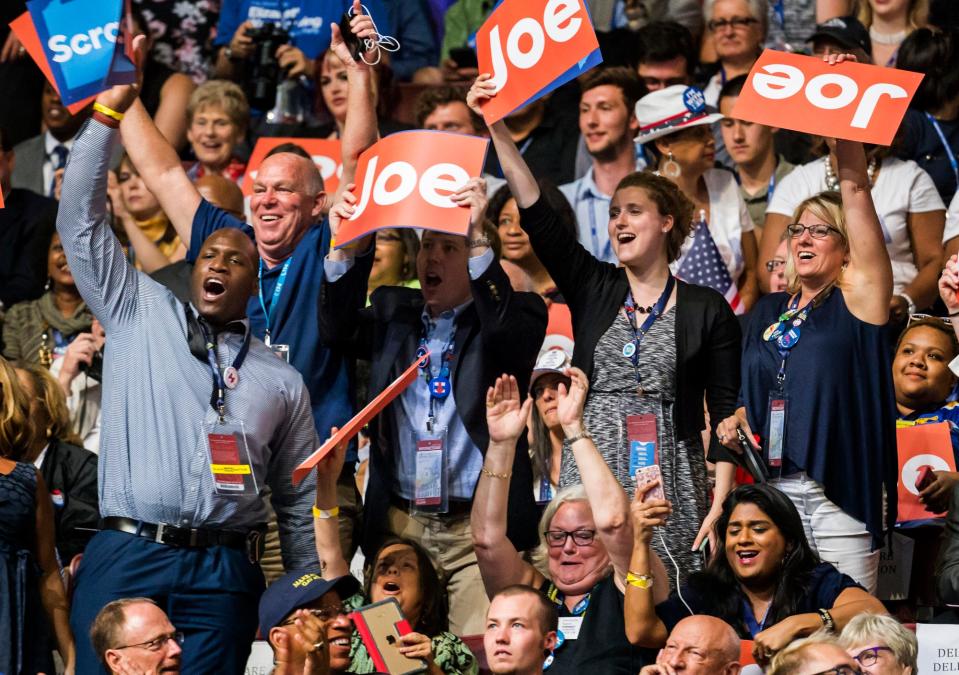GOP, Democratic conventions face uncertainties around coronavirus, but delegates are still eager
As Democrats and Republicans face uncertainties about their party conventions this summer, delegates and activists say the events are key to show contrasts between former Vice President Joe Biden and President Donald Trump.
Delegates say they are undaunted about attending in person as organizers adapt their plans to allow more space between visitors. Nothing beats the excitement of a live performance and the chance to meet with other activists, according to delegates.
“Anybody can watch the Super Bowl. They never suffer from selling tickets,” said Brian Hester, a Democratic delegate from Ohio who is eager to attend his first national convention. “There’s something in human nature of being at a historical event and saying you’ve touched history or were part of history.”
Conventions offer the opportunity for iconic moments when nominees or other speakers have a national audience to make a memorable impression. In 2016, former Gen. Michael Flynn led the chant of “lock her up” that summarized Republican criticism of Democratic nominee Hillary Clinton. In 2008, then-Alaska Gov. Sarah Palin highlighted her gender and her toughness as the GOP vice presidential nominee when she asked whether the audience knew the difference between a hockey mom and a pit bull. “Lipstick,” she said.
And in 2004, Barack Obama, then a little-known state senator campaigning to become a U.S. senator, electrified the Democratic convention by disavowing pundits who sliced and diced the country into partisan red and blue states. “We are one people, all of us pledging allegiance to the stars and stripes, all of us defending the United States of America,” he said.

But both parties are struggling with how to provide historic moments in uncertain times. Because of the threat of the novel coronavirus, Democrats might move a portion of their speeches and meetings online to avoid the large crowd of a traditional convention planned for Milwaukee.
Republicans, on the other hand, are working to ensure their event makes a splash. The party is scouting Nashville and other locations after North Carolina Gov. Roy Cooper notified the Republican National Committee Tuesday that its event planned for Charlotte would have to be scaled back because of the health threat. Las Vegas, Orlando and Jacksonville, Fla., and Georgia are also contenders to host the event.
“I think it’s really upsetting that the nature of the convention is still up in the air,” said Austin Smith, 25, the youngest member of Arizona's Republican delegation, who had to campaign for his seat and isn’t worried at all about getting sick. “It’s important to show the rest of the world who we are as a nation. We’re really excited to help the president."
'Let those on the other side ... go fete all their big donors'
Democrats postponed their convention a month, from July 13-17 to the week of Aug. 17, because of concerns about the coronavirus. But given the recommendations for social distancing, no decisions have been announced about whether delegates will crowd into a convention hall or perhaps hold most of the action online with smaller gatherings.
“I don’t think there’s anyone that would say, at this point, that tens of thousands of people should come together for a political convention,” House Speaker Nancy Pelosi, D-Calif., said at a news conference last week.
Former Democratic Party and convention chairman Joe Andrew argued that holding the event largely online offered a dramatic contrast with Trump. The national audience is watching on television anyway. But holding events online that show smaller gatherings would highlight concerns about the novel coronavirus that has killed 100,000 Americans and thrown 40 million people out of work, he said.
“Let those on the other side, the incumbents, go fete all their big donors,” said Andrew, global chairman of Dentons law firm. “They’re walking into a trap. The trap is you’re going to cover all those rich people in those suites having their canapes, drinking their Chablis and eating their brie, while everyone else is talking about 25% unemployment and 100,000 deaths and the mistakes that were made on the way to it. The contrasts are a killer.”
Andrew argued that Democrats are already more enthusiastic to defeat Trump than any other Republican opponent in years, so a convention isn’t needed for excitement. Messages in speeches should offer contrasts between the candidates for undecided voters, who don’t attend conventions in-person anyway, he said.
“The goal should be to find new and different ways to communicate that messaging to people that you get it, that you understand what they’re going through and that you literally share their day-to-day experiences,” Andrew said. “You wear a mask because they have to.”

Republicans seek options
Republicans were eager to meet as planned in Charlotte, but the party announced Wednesday that it would move the convention planned for Aug. 24 to 27 because Cooper couldn't promise that a full, traditional convention would be allowed. The Republican National Committee had sent Cooper a letter last week demanding guidelines, which prompted Cooper's response Tuesday and the scramble for a new location.
Republican delegates said Cooper was passing up an economic boom for his state.
"If Roy Cooper doesn’t lead on this, I think he’ll upset a lot of his own people if we don’t have the convention there," said Smith, the Arizona delegate. "They have that opportunity to send millions of dollars into that city, to help them."
Another Arizona delegate, Pam Kirby, 52, echoed Smith in saying she has no concerns about getting sick at the convention. As a leader in her state party and the Republican National Hispanic Assembly, Kirby said she has never felt more connected to the Republican Party than under Trump's leadership.
“He does a very good job of speaking to the everyday American people," Kirby said. "That’s his strength. That’s how he’s connected with people from all walks of life.”

Enthusiasm despite risks
Robert Dion, an associate professor of political science at the University of Evansville, said the overwhelming majority of Americans experience conventions through the news media or on television. But after attending the 2012 Democratic convention in Charlotte, N.C., Dion said there is no duplicating the excitement for participants of a live event, even if it meant he got little sleep and can't remember a good meal.
“There is nothing else like the excitement of being in a room with thousands of party leaders and party activists," Dion said. "It was exhilarating."
Ray Buckley, chairman of the New Hampshire Democratic Party, is ready to attend the convention in person – with a hotel lined up across the street from the convention center.
But his state convention May 9 was held online and yielded a dramatic increase in participation. About 4,000 people watched speeches including one from vice presidential prospect Stacey Abrams, who spoke from her home in Georgia, compared to the 400 to 600 who typically attend in person, he said. Some 900 votes were cast during two weeks of online voting on the platform and resolutions, he said.
“That’s by far the largest group of delegates that ever participated in adopting the platform, adopting the resolutions," Buckley said. “People are fully engaged. They’re feeling that they’re part of the process."
Bill DeMora, the Ohio delegate selection director, said delegates are enthusiastic. In January, 3,000 people filed to run for 89 slots as district delegates, he said. In a recent survey, 70 of 80 delegates said there were still interested in traveling to Milwaukee, he said. During the last three weeks – in the midst of the pandemic – 400 people have filed applications by a Friday deadline to become delegates in at-large seats or as party leaders and elected officials, he said.
“They obviously wouldn’t sign up if they knew they had to go to Milwaukee and didn’t want to go,” DeMora said. “People are eager. Obviously, if Milwaukee and the state of Wisconsin become what New York City was in March, that’s going to be a whole different scenario.”
DeMora has visited Milwaukee seven times since the site was announced. He’s been conferring with the hotel and busing company to have social distancing at breakfasts and while shuttling to events. But he hasn’t been since March 10 and 11, and he’s not sure how events will play out in bars and restaurants he lined up to hold up to 800 people.
“Do I have any idea what the convention is going to look like this time? No,” DeMora said. “But I know there’s no way anyone is going to go to a venue that packs people in shoulder to shoulder at a bar to drink.”
Ohio Republicans are also planning to attend their gathering, as The Cincinnati Enquirer found when it contacted 29 of the 82 delegates pledged to support Trump at the convention.
"I am ready to follow the president,” said delegate Ken Blackwell, former Cincinnati mayor and failed Ohio governor candidate.
Several states including Florida and Georgia have volunteered to host the GOP convention, but Ohio state Sen. Matt Huffman, R-Lima, said he will be attending no matter where it is held.
“It appears that the (coronavirus) morbidity rate and severity has been overestimated by an extraordinary amount – hospitalizations, deaths, effect on otherwise healthy people,” Huffman said.
For now, national delegates await each party’s decision. Hester said he’s got his Amtrak ticket, but doesn’t want to put anyone’s health at risk.
“There are ways we can effectively communicate to the American people by having a convention that is virtual or in-person,” Hester said. “I'm very excited to go. I think we’re going to show that this party is united, whether we do it by Zoom or in person in Milwaukee.”
This article originally appeared on USA TODAY: GOP, Democratic delegates eager for party conventions, despite virus

